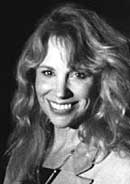Indies’ complaints resonated with Mitchell
Independent producers are saying nicer things about PBS, for a change. For years, they've been locked in an often-loveless interdependence — with indies accepting the low pay and slow decision-making because PBS was the gateway to grant money and the biggest audience for their films.
In the past, one indie said in an interview last year, PBS was a "maze," lacking "any well-defined greenlighting process." During her 25-year TV career, she had never gotten a program on PBS, though she tried once. "We never got an answer back from PBS, actually," she recalled.
Now that producer, Pat Mitchell, is president of PBS, she has moved quickly to minimize delay and confusion for producers submitting tapes and proposals.
Most vocal of the hopeful indies is Patric Hedlund, a Los Angeles producer who did that interview with Mitchell for the Independent Film & Video Monthly earlier this year.
Hedlund had already started her own campaign to demystify PBS for indies, publishing a long article in the Independent last March: "Following the Bread Crumb Trail Through the PBS Jungle." The article proved so popular that she expanded it into a handbook last fall.
"If you can give people a map, more will be able to find their way to the finish line," said Hedlund. Her writing introduces indies to the many players in public TV — stations, funders and distributors, most notably PBS — and makes it clear that, even with a map, dealing with public TV was frustrating, difficult and slow.
Mitchell said she read the "Bread Crumb Trail" article on her first day at PBS, and told her programming staff that it posed a lot of questions PBS would have to answer, according to Hedlund's interview. "I took it as a roadmap for our conversations in the beginning," said Mitchell, "a guideline to things we need to do better."
PBS established a new tracking system to handle the ongoing deluge of submissions; assigned teams of staffers to review proposals; hired three regional programming vice presidents to relieve the program review bottleneck and to develop new projects; and launched a new website (www.pbs.org/producers) to explain its system to indies.
The website warns producers, for instance, that PBS has plenty of nature films, but says the network especially wants adventure programs, shows for school-aged kids, "observational documentaries" like The Farmer's Wife, and science programs to pair with Nova.
Has PBS mended its ways? Mitchell has worked at PBS barely a year, but Hedlund hears encouraging news from a couple friends among Los Angeles indies.
One well-connected documentarian with a completed, award-winning film, who didn't want to be identified, said dealing with PBS during recent weeks has been "a very positive experience," after her agent hit a dead end at a presenting station.
Another filmmaker, Kathy Eldon, was already a big fan of Mitchell and her Los Angeles programming veep, Jacoba Atlas, and says they're putting "phenomenal" energy into PBS's programming outreach.
Mitchell is "the closest person on the planet to Superwoman," says the filmmaker. "She's a tremendously charming woman, but, like a steel magnolia, she is absolutely determined and has the energy of 10 race horses. She believes in the possibilities, she believes in miracles, and is not afraid to put in the hard work."
Kathy Eldon and her daughter Amy worked twice with Mitchell and Atlas when the PBS execs were back at Turner Broadcasting, commissioning documentaries. In 1997, TBS aired their Dying to Tell the Story, about journalists killed in the line of duty, and last year Turner's CNN carried Soldiers of Peace, about a children's movement for peace in Colombia. But Turner isn't a great option for Eldon anymore. She says CNN could spend $350,000 on a documentary back in 1999, but today would spend a third of that.
PBS pays less than a third of costs, Eldon says, but it does open the door for philanthropic support from foundations, federal endowments and corporate underwriters. Now she's chasing grants for a PBS project, Global Trek, a proposed magazine-format series for young people "about what's hopeful in the world today." KCET execs are also "rolling up their sleeves" to find underwriters, she says.
Before Mitchell left Turner, Eldon had piloted the series for CNN, and PBS gave her partial funding for another pilot last fall. The filmmakers shot the pilot in South Africa, completed it in December and last month got the word from PBS that they should start fundraising.
Hedlund's handbook introduced her to this strange world of PBS filmmaking. "Patric's book made me really frightened, I had to say," she says, but it also gave her examples of filmmakers who had succeeded in placing major projects on public TV.
Eldon clearly enjoyed doing business with Mitchell, but they also shared an internationalist idealism that marks Mitchell's old boss Ted Turner as well. Many indies likewise share common values with people in public TV.
With many indies aiming for the same big goals as PBS, Hedlund says, she originally couldn't understand why they didn't have a natural alliance.
PBS is the nation's "last campfire," Hedlund says. It's one of the few places where Americans share their beliefs and act as neighbors. "What PBS does, at its best," she says, "is incomparable in our society."
Web page posted May 1, 2001
Copyright 2001 by Current Publishing Committee
